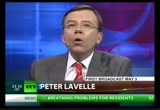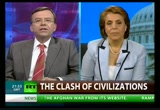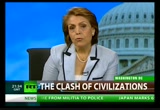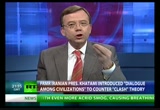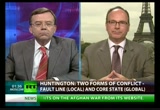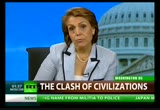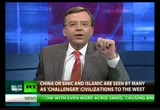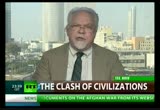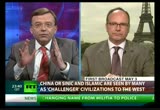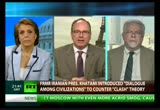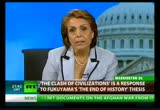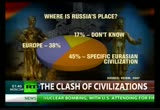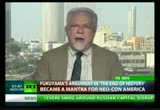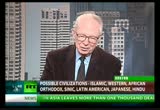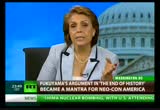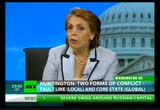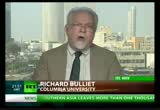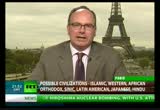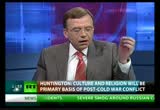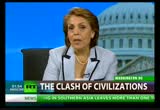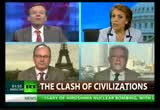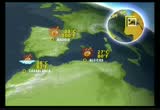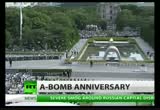tv [untitled] RT August 6, 2010 5:30pm-6:00pm EDT
5:30 pm
ology today with the rise of china the islamic world and emerging economies is the world prone to more clashes particularly with the west. bank. to discuss of huntington's faeces stance today i'm joined by richard bullet in tel aviv an author and history professor at columbia university in washington we have serene hunter she's a visiting professor at the center for muslim christian understanding at georgetown university in paris we go to john laughlin of the institute of democracy in cooperation and another member of our crosstalk team on the hunger all right folks cross talk rules and in fact that means you can jump in anytime you want to comment on what i've said or other panel members have said all right i'd like to go to you first serene it's about fifteen a little over fifteen little less than fifteen years since huntington's thesis came out how valid is it today because since the cold war we see
5:31 pm
a lot of conflicts and many people would say it's more or less culture not ideology not philosophy that is driving not all but many of these conflicts. well i frankly disagree with that then i disagree with the very early on of it sam huntington when he first raised this issue in his foreign affairs journal in one thousand nine hundred three i think that first of all one of the reasons why we're emphasizing culture distaste is that for almost couple of hundred years the role of culture was not really paid enough attention to although it was influential even at that time the second thing is that you know most of the conflict that we have seen emerging in the course the. soviet or post cold war era you know yes true that some groups have justifies their actions or whatever in cultural or religious terms but when you really look at it they have other other really causes i mean
5:32 pm
a lot of it has to do you know where maybe like let's say that in the post soviet space or. independence or autonomy or you know even in some other areas there are other factors even in the cold war era ideology yes it was important but you know both state behavior and non est behavior was motivated by you know every rioting in a mix of motives and ideology was just one of them or give it ideology now is not really that at the center of things if i go to you john locke when i find it very interesting if you agree or disagree with huntington's thesis a lot of people in the non-western world with say yeah it's right because it's breaking what's perceived to be western hegemony or western in western influence in non-western countries whatever west is we could talk about later but i mean in a way he's given a lot of people a tool to say yeah this is how the world works this is how conflict works but i
5:33 pm
think that shereen was right to say that the sources of these conflicts such as they've been have generally been ideological i mean let's look at the comp. the conflict such as it is between the west and islam will leave for a moment the definition of those terms seems to me that the conflicts that western countries have with islamic countries precisely are ideological and not civilizational conflicts we only have to look at which islamic countries are affected we're talking of course about iraq iran and afghanistan but there are many other islamic countries which are not affected by any conflict with the west the whole of north africa turkey saudi arabia indonesia the list goes on these conflicts such as they are are fairly straight forward diplomatic political and to some extent ideological conflicts largely associated with the middle east and problem so i really don't think that the conflicts that of broken out bear out the
5:34 pm
civilizational paradigm it should be added by the way that the biggest conflict in world history since the second world war is one that nobody hardly ever mentions and that is the war in the congo which has claimed millions of lives it's a far higher death toll than any of the other conflicts that we usually talk about in these discussions and i'm pretty sure that nobody would want to argue that that was a civilizational conflict either. shereen you want to jump in there real quick. yeah i just wanted to say also another thing that we must also understand that when you look at things and pieces think term even. distinguishes cultural fault lines let's say that the within societies that have historically been christian i mean for example he says that there will be incompatibilities between western civilization and those countries that are orthodox christians with direct reference for instance to russia and he talks about you know that in compatibility of
5:35 pm
buddhist confusion in societies with the west in which he defines as kind of a protestant anglo-saxon type of you know aspects of the west so it seems to me that you know we shouldn't really single out the muslim world and the other thing you mentioned that you know the desire to retain of one's cultural identity and not to become absorbed by other culture is this was something that even was revelant in the nineteenth twenty's and thirty's all the way through the nineteenth sixty's and seventy's in what we are calling the muslim world even though the dominant discourse those years was a secular discourse and that islam is just kind of lately has. kind of taken over the discursive. field ok richard of i'm going to you in tel aviv. something kind of very interesting to me i guess it was the cold war when culture
5:36 pm
took a break or civilization took a break because ideology was so predominant it least for decision makers in the major countries so culture is always been there it's just being reserved we're just taking notice of it again. well i'm going to take issue with the term culture because even though that is what huntington was talking about the way in which his his catchphrase of clash of civilizations is being used deals with religion which is a very different from culture and it's different from civilization but because he chose a religious term to characterize a civilization at a time when. this country i rather the united states. and different countries with muslim populations were becoming energized by religious issues people have taken this phrase clash of civilizations ignored huntington's
5:37 pm
presentation of it and instead interpreted it as islam versus the west so inadvertently and i think perhaps naively huntington open the door to the islam a phobia that we have today which i think is incredibly destructive and it is rendered clash of civilizations a. highly not only misleading but a very destructive. reprehensible phrase and yet it has gained more and more usage among the man on the street and i think that one of the problems we have is comparing what the huntington thought he was doing with what is actually transpired you know john it's an interesting comment and it is it really after two thousand after nine eleven scuse me we saw the really the neo cons hijack this this concept they like the idea they like the idea of conflict of civilizations it's and them against us against the west is that or is that
5:38 pm
a that's a perversion of one hundred ten was trying to say. yes it is it is a perversion and it's a perversion both from the point of view of the neo cons but also from the point of view of islamic fundamentalists obviously the neo cons were themselves intensely ideology call and therefore they hijacked underpins these suits which was anti ideological because he said that precisely conflicts wouldn't be ideological but the islamic fundamentalists themselves surely must be understood not as huntington does in a nonpolitical civilizational way but instead as people pursuing political goals political goals that we may disagree with but they are clearly recognisable political goals and i include in that remark even the terrorists who conducted the nine eleven attacks those people were acting according to very easily understandable political and strategic goals concepts which incidentally probably largely have western origin anyway even though they're of course also driven by the
5:39 pm
islamic religion so the notion that these conflicts are not political i think is the greatest weakness of huntington's analysis because on the contrary they are ok sure. if we could go ahead how much how do we get ready to go ahead ahead go. well i think that you know one thing we have to understand that it's very difficult to actually if you took if you are looking at the actions of international actors whether they are state actors or non sait actors we have to realize two things one is that actions are motivated by different you know intentions and so on the other thing is that it is very difficult to find anybody who would say that what they are doing is for power or for gaining access to resources or basically you know self aggrandizement so everybody is going to have to justify their actions in life to have some grander objective or selfless objective for example let's say in the cold
5:40 pm
war the west would say that this is to make world safe for democracy socialists would say that they want to create this socialist utopia but in the meanwhile the books are also pursuing other actions nothing has changed muslim fundamentalists or even terrorists they may have some really selfish reasons for what they are doing but they never going to state that so therefore they're saying that we are fighting for islam or whatever and. then jump in line they're also ok i'm sure brett will continue right i'm going to break after a short break we'll continue our discussion of the clash of civilizations stay with our. it. was. one of the key elements of democracy. which is so uncomfortable for me
5:41 pm
a saudi. who pays for the news. how dependent does this independent media. who is behind the t.v. star. george media. and reality. develop for bush for the bush. always by one vote. so the people that are going to be validating this machine can stand there all day long and vote for somebody and it will be right every time but the guy can walk up here and if he hits the right buttons he can. say.
5:43 pm
let's see what russians think. is the world experiencing a clash of civilizations most russians don't think so all the russian public opinion research asks citizens about the place of russia in the more than world forty five percent said russia is neither europe no asia but the specific eurasian civilization they also believe its interests will lean towards the east in the future so take percent of the respondents think russia is obviously part of europe and in the twenty first century the fortunes of the two interdependent however they
5:44 pm
cannot be any doubt that russians believe their countries threatens both east and west giving the country a unique identity and place in the more than world peeta all right now we're joined in boston with by richard rosecrans he's he's an adjunct professor at harvard university's john f. kennedy school of government right before we went to break here before we go to richard in boston i'd like to go to richard in tel aviv you were responding to a point that shereen was making about how do you how ideology and culture or used or misused. the is the issue of international conflict and the motivation for it which john had been talking about is well taken but i think one of the things that that people have to realize is that most muslim militancy is directed against other muslims it is not a matter of often in the united states at least people seem to think that islam is some sort of unified community that that they have a common outlook on the world but the fact of the matter is that when it comes to
5:45 pm
two militant actions muslims activists are more inclined to be concerned about their home their homeland changing the government there than they are about the international arena ok richard if i go to you in boston and thanks for coming in a little bit late in the program but we've been talking about the veracity of huntington's thesis in two thousand and ten and whether is it really true that culture his superseded ideology when we look at conflicts around the world. no i think culture certainly has not superseded ideology but even more important in a certain ideology is globalization because you have globalization bringing people together even when ideology does not fully do so i mean look at the impact of globalization the muslim society in indonesia and malaysia even to some degree in parts of pakistan and so on look at dubai does that look like the rest of the arab
5:46 pm
world certainly it does not so i think one has to factor in another element there are not simply ideology as an alternative to culture but globalization is an alternative ok i mean it's interesting listening to all of the comments that everyone's made in this program so far i mean just to turn. this to civilization make any sense at all using that term and talking about world politics because everybody seems to think not well. well i think that you know this is the whole thing the whole the problem with this thesis is that his definitions lack of rigor i mean he uses culture civilization and religion and so on interchangeably and i think that he also. kind of. gives religion if far too dominant position in defining you know people's cultures or even broad civilization let's say that something called islamic civilization this is the term even itself is debatable you know because what we know of as islamic civilization actually many
5:47 pm
aspects of it has very little to do with islam except that it happened in countries and what is that you know happened you know can i just one other we're really pleased that they didn't finish what i'm saying the other thing that i wanted to make here is that what has been have actually seen happen is not you know particular since the cold war but even before that it's not that ideology has disappeared but religion has become ideology and this is something that people don't. today by the way that muslims among themselves in fact fight over what is meant by islam so this is why that you know i know what to do to other people not to early on that what to be had see having clashes in fact more we did a civilization but it is because religion has become ideology and serving purposes that ideology used to serve and use for legitimizing the legitimizing and so forth
5:48 pm
all right richard in tel aviv going to jump in there. sure the i think that in talking about what huntington meant or how we understand his definitions or his rubrics that is kind of misguided i mean the two day clash of civilizations is a phrase it's being used by the man on the street who has never read huntington has never even heard of having to the there's been a kind of a viral spread of this of this term in a way that has really ignored both ideology and culture and the specifics of international conflict and has played into very very deep currents of bigotry i think on both sides of the religious divide and whether one likes it or not huntington's definitions no longer govern the discourse in which is phrases used ok
5:49 pm
john if i can go to you in paris i mean what's the corrective here what should we be focusing most of our attention on if it's not civilization because i guess none of us really agree that maybe a global civil either there's a global civilization or the civilization itself is it's immaterial but i mean what is the corrective here as we just heard you know every but the man on the street thinks about it in terms of clash of civilizations and we seem to all do agree that isn't the case. yeah well i think the problem is that basically huntington is writing from the point of view of nostalgia he like many analysts actually had a heart harbored a secret nostalgia for the certainties of what he thought of the certainties of the cold war and you know we see this in his history historical introduction which is excuse my language the biggest load of bunk i've ever read my life you know he says that prior to the cold war the world was not multi civilizational well you know this is absolute nonsense and so i think the answer really comes in the form of is
5:50 pm
a rather more complex one than he would it would except it's something along the lines of what you said earlier conflicts come from all kinds of sources i suppose they can come from cultural or civilisational ones i personally think ideology does play a very big role in fueling conflict but of course as i said in the first part of the biggest war the biggest war since the second world war is the war in the congo which is not ideological and not. civilization in any way it's just an old fashioned war over resources. and finally of course can also be driven by simple advances in technology you know the manufacture of kalashnikovs i expect has probably driven up the amount of people killed so these are all factors which come together. but ultimately the number of conflicts i'm not sure if it has increased anyway so i think the general paradigm the idea that suddenly the world has become more dangerous because there are these two blocks i suspect that that's wrong too ok shereen john was talking a lot about ideology here why is there so much interest in culture i mean maybe
5:51 pm
huntington started it we've heard from richard that it's gone into the mainstream here is it just more sexy it's easier to understand complex in the world if we talk about culture because that's just you know be something that people can easily identify with the cold war is over there's no way to really ideology people get their hands on that is that it is that a reasonable answer. i don't really think quite that way although you know there is elements of truth in that but basically let's face it that i would say that at least roughly since the nine hundred thirty s. in general the whole idea that states could behave only or even non-state actors unselfish motives became discredited in the past for example we had wars because of dynastic reasons we had wars of conquest and so on after that you know we had this very almost i would say totalitarian not necessarily only in terms of the oppressive but to take terry an ideology in
5:52 pm
a sense is that they really extended to all aspects of life whether it was fascism socialism i mean the way liberal democracy is also. off except so when you have for forty years fifty years we had this cold war that we thought that the whole war of the is caught in the existential battle between you know socialism and market you know liberalism you know i think that i think john mentioned paris john mentioned that. huntington was talking of nostalgia is some just said that when you last see this called who are paradigm people find it very difficult to explain and make sense of this cafe me all things that was happening internationally and huntington you know caught this culture thing and lashed on that and actually i have to say that it wasn't hunted down came up with the clash of civilization it was bernard lewis in the roots of the muslim right he came around sharing and then we run out of time gentlemen but i was really what are you ok many thanks or i
5:53 pm
5:55 pm
5:57 pm
a. little. little. little. the number of dead in wildfires sweeping russia rises to fifty two firefighters stepped up their battle as flames are proto areas contaminated after the noble catastrophe. calls for a nuclear free world as a mark sixty five years since the atomic bomb which destroyed the city taking tons taking tens of thousands of lives. whole a new president brought us
5:58 pm
a lot of power of skiis sworn in for a five year term he succeeds lech kaczynski was killed in a plane crash into russia in april. two am here in moscow i'm mad thanks for being with us here on r t our top. story with the summer heat wave now fueling wildfires in twenty two regions across russia the death toll has risen to fifty two more than thirty five hundred people have been left homeless meanwhile the capital is shrouded in dense fog the worst the city has ever experienced or t.c.c. bivins has more small just really has come in and has blanketed no matter how healthy you may be opposite saying to stay indoors and if you have to many reasons
5:59 pm
they're urging you to wear a mask it's awful outside and it hurts to breathe this stuff and then once you do you taste it for hours after you've gone inside your homes are also getting reports that in certain areas throughout moscow the air quality is twenty times poorer than usual so this is a very serious situation and this is all going down as firefighters continue to battle blazes throughout the country six hundred fires and so far one hundred fifteen thousand have been burned but to give you an idea exactly how big that is we're talking about lining up one hundred fifteen thousand baseball fields or one hundred fifteen thousand international rugby field it's a huge amount and seven regions have been declared a national disaster area with emergency ministry is also worried about their air we're not just talking about the pollution and the smog that we see now but we're also talking about radioactive particles that could find its way into the air the ministry has its eye on the street and which was affected by the church no.
31 Views
Uploaded by TV Archive on

 Live Music Archive
Live Music Archive Librivox Free Audio
Librivox Free Audio Metropolitan Museum
Metropolitan Museum Cleveland Museum of Art
Cleveland Museum of Art Internet Arcade
Internet Arcade Console Living Room
Console Living Room Books to Borrow
Books to Borrow Open Library
Open Library TV News
TV News Understanding 9/11
Understanding 9/11